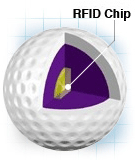RFID Technology Revolutionizes Golf Experience: Precise Tracking and Efficient Management
- Share
- Issue Time
- Aug 21,2024
Under the sunlit skies of golf courses, every golf ball's flight trajectory carries the aspirations and dreams of the golfer. However, traditional golf management methods often face numerous challenges, such as lost golf balls, inaccurate scoring, and inefficient course management. Now, with the introduction of RFID technology, these issues are gradually being resolved, transforming the golf experience into a more enriching and convenient one.
RFID Technology Overview
RFID technology is a non-contact automatic identification technology that utilizes radio waves for communication. By installing RFID tags on objects and communicating with compatible readers, rapid and accurate identification and information transfer can be achieved. This technology boasts advantages such as long recognition distances, fast recognition speeds, and strong anti-interference capabilities, making it widely applied in logistics, warehousing, retail, and other sectors.
Specific Applications of RFID Technology in Golf
1. Golf Ball Tracking and Localization
By embedding RFID chips in golf balls, fixed or handheld RFID readers on the course can capture signals emitted by the chips in real-time, enabling precise tracking and localization of golf ball trajectories. This feature not only helps golfers quickly find lost balls but also allows spectators to visually see the ball's flight path, enhancing the viewing experience and fun of the game.
2. Scoring System Optimization
By installing RFID tags and readers in golf balls and holes, the system can automatically record each ball's hit, landing point, and score, eliminating errors and disputes that may arise from manual scoring. This automated scoring method improves accuracy, reduces the workload of judges, and makes competitions more fair and impartial.

3. Intelligent Course Management
RFID technology is also applied in the intelligent management of golf courses. For example, by attaching RFID tags to golf carts, bags, and other items on the course, staff can real-time monitor their locations and statuses, optimizing resource allocation and management efficiency. Additionally, RFID technology can integrate with access control systems, membership management systems, etc., enhancing the overall operational efficiency and service level of the course.
Case Study
Taking TopGolf golf course in Texas, USA, as an example, this course leverages RFID technology to achieve precise tracking and real-time display of golf ball trajectories. By adopting passive EPC Gen 2 UHF RFID technology, TopGolf has installed RFID tags and readers in 20,000 golf balls and 548 landing points. This system not only enhances scoring accuracy but also enables spectators and golfers to see the ball's flight path and landing point in real-time, significantly improving the sporting experience and viewing pleasure.
Conclusion
The introduction of RFID technology has brought unprecedented changes to golf. By enabling precise tracking of golf ball trajectories and automated scoring, this technology not only improves competition fairness and viewing experience but also promotes intelligent and efficient course management. As technology continues to advance and application scenarios expand, we have every reason to believe that RFID technology will play an even more crucial role in the golf industry, delivering a richer and more diverse golfing experience for golfers.